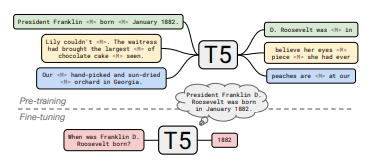Google's T5 for Closed Book Question Answering.
The model was pre-trained using T5's denoising objective on C4, subsequently additionally pre-trained using REALM's salient span masking objective on Wikipedia, and finally fine-tuned on Web Questions (WQ).
Note: The model was fine-tuned on 100% of the train splits of Web Questions (WQ) for 10k steps.
Other community Checkpoints: here
Paper: How Much Knowledge Can You Pack Into the Parameters of a Language Model?
Authors: Adam Roberts, Colin Raffel, Noam Shazeer
Results on Web Questions - Test Set
| Id | link | Exact Match |
|---|---|---|
| T5-11b | https://huggingface.co/google/t5-11b-ssm-wq | 44.7 |
| T5-xxl | https://huggingface.co/google/t5-xxl-ssm-wq | 43.5 |
Usage
The model can be used as follows for closed book question answering:
from transformers import AutoModelForSeq2SeqLM, AutoTokenizer
t5_qa_model = AutoModelForSeq2SeqLM.from_pretrained("google/t5-11b-ssm-wq")
t5_tok = AutoTokenizer.from_pretrained("google/t5-11b-ssm-wq")
input_ids = t5_tok("When was Franklin D. Roosevelt born?", return_tensors="pt").input_ids
gen_output = t5_qa_model.generate(input_ids)[0]
print(t5_tok.decode(gen_output, skip_special_tokens=True))
Abstract
It has recently been observed that neural language models trained on unstructured text can implicitly store and retrieve knowledge using natural language queries. In this short paper, we measure the practical utility of this approach by fine-tuning pre-trained models to answer questions without access to any external context or knowledge. We show that this approach scales with model size and performs competitively with open-domain systems that explicitly retrieve answers from an external knowledge source when answering questions. To facilitate reproducibility and future work, we release our code and trained models at https://goo.gle/t5-cbqa.
- Downloads last month
- 21
